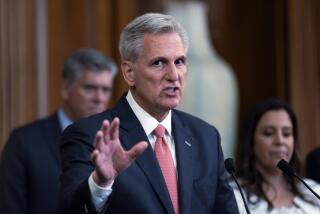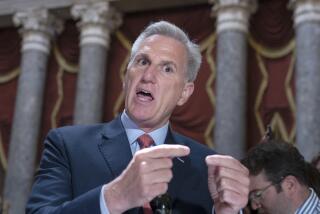Difficult Choices in an Election Year : Need for More Deficit Cuts in ’88 Seen
- Share via
WASHINGTON — President Reagan and Congress will have to take another whack at the nation’s huge budget deficit in 1988 if the U.S. economy is to avoid a crippling recession and continue to grow, according to Democrats, Republicans and leading financial analysts.
Even though it may be politically difficult to reopen the deficit-reduction issue in a presidential election year, Rep. William H. Gray III (D-Pa.), chairman of the House Budget Committee, warned Sunday: “We’ve got to do a lot more . . . we’ve got a major structural deficit problem.”
Other experts, looking back on a year in which the stock market crashed and the value of the dollar plummeted, said the U.S. economy will be buffeted more in 1988 by shifting international pressures than election-year considerations.
Playing ‘Global Chicken’
West German banks, for example, could decide to play a game of “global chicken” and trigger a burst of high interest rates in the United States by refusing to shore up the value of the faltering dollar, according to Peter G. Peterson, commerce secretary under Richard M. Nixon.
Gray and Peterson, appearing on the NBC-TV show “Meet the Press,” agreed that the nation’s recently enacted $76-billion deficit reduction plan did not go far enough and that postponing further cuts was unwise.
“There are 535 members of Congress, there are 535 different plans, but only one can be implemented with the President’s help,” said Gray, who helped draw up the bipartisan deficit-cutting plan. “We’ve got to find that one early in 1988 to keep this economy going if we want to avoid a recession.”
The task of cutting the nation’s budget deficit, which is projected to reach $160 billion this year, will not be carried out without strong bipartisan support, including a joint determination to look at new revenues as well as additional spending cuts, Gray said.
Congress’ Bickering
But he conceded that Congress, which bickered and struggled for nearly three months before finally approving a deficit-reduction program two days before Christmas, may be reluctant to reopen the issue so soon.
Sen. Phil Gramm (R-Tex.), who also appeared on the NBC program, warned that unless Congress agrees on a new round of spending cuts in the next few months, the nation will jeopardize its economic recovery and risk a major recession.
“I just don’t think we’ve done enough . . . we’re going to have to come back very quickly and do more,” he said. “I think it’s clear that we have yet to see Congress respond to the perilous economic circumstances we face.”
Gramm and Gray clashed over the kinds of programs that should be cut. The Texas senator suggested that federal subsidies for urban mass transit be eliminated, while the Philadelphia-area congressman urged that federal support for the cattle industry and certain agricultural subsidies be ended.
Pressures on Dollar
They agreed, however, that international market pressures--particularly those affecting the value of American currency--may have more of an impact on the U.S. economy this year than budgetary wrangles in Congress.
Peterson said these foreign market pressures could create “an interesting tug of war” between Fed Chairman Alan S. Greenspan and Treasury Secretary James A. Baker III. He noted, for example, that Baker is determined to avoid high interest rates that could slow down the nation’s economic recovery. But he said Greenspan, who must defend the value of the dollar on the world market, may have no choice but to raise interest rates if the American currency continues to fall.
Neither Reagan appointee wants that to happen, especially in an election year, Peterson said. But the issue may be out of their control, because “the economy this year is likely to be less about economics and a lot more about politics, psychology and patience.”
Peterson, who is an investment counselor, added that Congress’ refusal to enact major deficit reductions has sent discouraging signals to world markets. The consequences of this could become apparent soon, particularly with West German banks that have played a major role in helping to shore up the faltering dollar, he said.
At some point, these banks might discontinue their support, Peterson noted, reasoning that Americans “aren’t doing much . . . about the budget deficit and aren’t willing to raise interest rates to support their dollar. (So) maybe they need the hell scared out of them.”
As a result, he said, the U.S. economy is now more than ever subject to the whims of what foreign markets do and “may be out of the control” of Greenspan, Baker and other top fiscal officers.
More to Read
Sign up for Essential California
The most important California stories and recommendations in your inbox every morning.
You may occasionally receive promotional content from the Los Angeles Times.










